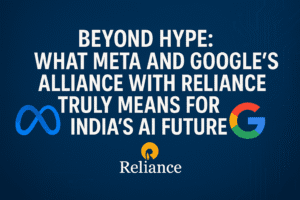Beyond Hype: What Meta and Google’s Alliance with Reliance Truly Means for India’s AI Future
The recent Reliance AGM highlighted a pivotal shift, as Meta and Google announced partnerships to propel India into an AI-powered future. Mark Zuckerberg outlined a vision of “personal superintelligence,” aiming to democratize powerful, open-source AI tools for businesses and individuals. Concurrently, Sundar Pichai announced a dedicated Google Cloud region in Jamnagar, providing the crucial computational backbone for this ambition. This fusion of global technology with Reliance’s vast local reach promises to transform enterprises and small shops alike.
The core promise is a bottom-up revolution, fostering homegrown innovation to solve unique local challenges. However, its success hinges on parallel investments in digital literacy and strong ethical frameworks. Ultimately, this collaboration positions India not just as a consumer, but as a primary architect of the next global AI era.

Beyond Hype: What Meta and Google’s Alliance with Reliance Truly Means for India’s AI Future
When the annual meeting of an Indian conglomerate becomes a global talking point for the future of artificial intelligence, it’s a sign that something significant is shifting. The recent Reliance Industries AGM wasn’t just about financial results; it was a strategic declaration. With Meta’s Mark Zuckerberg and Google’s Sundar Pichai taking the virtual stage, the message was clear: India is not just a market for AI consumption but a pivotal forge for its creation and democratization.
This partnership moves beyond mere corporate collaboration. It represents a fusion of global technological ambition with unparalleled local scale, aiming to weave AI into the very fabric of India’s economy. But what does this actually mean for businesses, developers, and everyday citizens?
The Vision of “Personal Superintelligence”: Empowerment or Evolution?
Mark Zuckerberg’s comments were notably ambitious, centering on a concept that sounds like science fiction: “personal superintelligence for everyone.”
This isn’t just about smarter chatbots or photo filters. Zuckerberg is describing a future where AI assistants become deeply personalized partners—capable of managing our health data, optimizing our work, accelerating scientific discovery, and tackling complex personal and professional problems we lack the time or expertise to solve alone.
His key mechanism? Open-source. By delivering Meta’s open-source AI models (like their Llama family) to Indian businesses through Reliance Jio, they are effectively placing the building blocks of advanced AI into the hands of a massive developer ecosystem. This approach:
- Lowers Barriers: Startups and individual developers won’t need billions in compute power to build cutting-edge applications.
- Fosters Innovation: It allows for local customization, solving uniquely Indian challenges in agriculture, healthcare, education, and logistics in ways a top-down, Western-developed AI might never conceive.
- Spurs a Ecosystem: It positions Jio Platforms as the foundational layer upon which a new generation of Indian AI-native companies can be built.
However, this vision also raises crucial questions about data privacy, algorithmic bias, and the societal impact of such powerful, pervasive technology—questions that will need answering as this vision unfolds.
Google’s Ground Game: Bringing the Cloud to Jamnagar
While Meta spoke in grand visions, Sundar Pichai announced a concrete, foundational step: a dedicated Google Cloud region in Jamnagar.
This is a tactical masterstroke. A cloud region means local data centers, which translates to:
- Radically Lower Latency: For a kirana store owner using an AI tool for inventory management or a doctor using a diagnostic app, speed is critical. Local data centers mean near-instantaneous responses.
- Enhanced Data Security and Sovereignty: Sensitive data can remain within the country, addressing a key concern for Indian enterprises and the government.
- Unlocking Enterprise AI: This provides the essential fuel—massive computing power—for Reliance’s own vast operations (in retail, energy, telecom) to transform, and in turn, offers that same power to every small business and startup that partners with them.
Pichai rightly framed this as the “next leap” following their previous partnership that democratized internet access. First, they brought the internet to millions. Now, they are bringing the intelligent cloud.
The Human Insight: More Than Just Technology
The real value of these partnerships isn’t just in the models or the data centers; it’s in the distribution.
Reliance Jio’s unparalleled reach into urban and rural India provides a ready-made pipeline. Imagine:
- A farmer accessing hyper-local weather and soil advice via a WhatsApp-like interface powered by Meta’s AI and distributed by Jio.
- A small sari shop in Varanasi using a simple Jio-built app, running on Google Cloud, to predict bestselling designs and manage supply chains.
- Students across tier-2 and tier-3 cities using AI tutors tailored to their local curriculum and language.
The potential for genuine, large-scale empowerment is staggering. It represents a bottom-up approach to AI adoption, where technology is built for and shaped by the needs of its users, rather than being a one-size-fits-all product imported from elsewhere.
The Road Ahead: Cautious Optimism
For this vision to become a reality, several pieces must fall into place:
- Digital Literacy: Access to tools is meaningless without the skills to use them effectively. This will require massive investment in training and education.
- Robust Guardrails: As Zuckerberg himself alluded to, superintelligence is a powerful force. Its development in India must be accompanied by a strong framework of ethics, transparency, and regulation to prevent misuse and bias.
- True Collaboration: The partnership must be more than a branding exercise. It requires a genuine transfer of knowledge and capability to Indian engineers and businesses to build self-reliant expertise.
The Reliance AGM was a promise—a glimpse of a future where India is an active architect of the AI age. The collaboration between global tech giants and local prowess is the catalyst. The real work, and the real value, will be in how we build upon this foundation to create an inclusive, intelligent, and truly empowered future for all.
You must be logged in to post a comment.